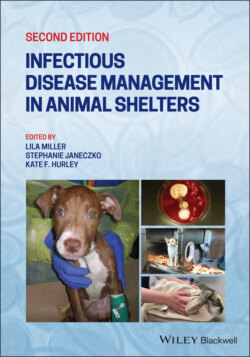Читать книгу Infectious Disease Management in Animal Shelters - Группа авторов - Страница 100
Test Kits
ОглавлениеUrine chemical reagent strips
Blood urea nitrogen test strips (e.g. Azostix®, Shelby Scientific, Macomb, MI)
Commercial diagnostic test kits (e.g. heartworm antigen, canine parvovirus antigen, feline leukemia virus, feline immunodeficiency virus)
Many diagnostic tests rely on the collection of a sample of tissue, blood, urine, feces, or other bodily fluid (versus those that rely on contemporary historical, physical, or clinical findings). For such specimens, the diagnostic utility of the sample is often only as good as the collection technique and specimen handling. With careful planning and staff training, many diagnostic samples can be collected cage‐side or even in a foster‐home environment. Test kit manufacturers and diagnostic laboratories often have instructions and consultative services readily available to provide such direction when needed. Though veterinarians should direct the process, many individuals comfortable with basic animal handling can be trained to perform the actual sample collection for the most common diagnostic tests where permissible under applicable laws and regulations.
Once collected, diagnostic samples should be handled with care, particularly when being prepared for shipment to an outside laboratory. In general, cytologic samples should be rapidly air‐dried and stored at room temperature; care should be taken not to crush or smear slide preparations. If not evaluated within 4 hours of collection, samples of blood, bodily fluids, or those intended for culture should be stored under refrigeration and processing should occur within 24 hours. See Chapter 5 for information on the collection and handling of necropsy specimens.
